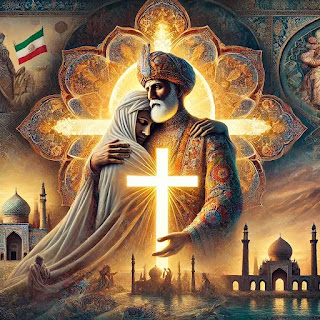As someone of royal lineage from the Safavid Dynasty, born into the heart of Persian culture and heritage, I have spent much of my life questioning, exploring, and ultimately embracing the values that define my identity today. Christianity is the foundation of my faith and worldview, not simply because of a personal spiritual awakening, but because of its profound resonance with the shared values and histories of people with white heritage from West Asia, North Africa, and Europe.
This essay explains why Christianity uniquely appeals to these regions’ people compared to Judaism, Islam, and Paganism. My journey from ex-Muslim to Christian illuminates these contrasts and exposes the transformative power of Christ’s message, which transcends race, ethnicity, and history while preserving the beauty of Western civilization.
Historical Connections to Christianity in White West Asia, North Africa, and Europe
Christianity has an unparalleled historical connection to the ancient cultures of these regions. From the early Christian churches of the Roman Empire to the rich Byzantine and Armenian traditions, Christianity offered something Judaism and Paganism could not: a universal yet personal message of salvation through grace and not through lineage or tribal law.
Islam arrived in the seventh century, imposing its rigid, Arab-centric laws and stripping the native cultures of their heritage. In contrast, Christianity respected and assimilated local traditions, such as the Greek philosophical heritage or the Persian reverence for light and truth, without compromising its core doctrine. It became the faith that celebrated the individual while uniting diverse people under the banner of Christ.
Judaism, while preserving its traditions, remained insular and covenant-bound to a single ethnic group. Paganism, meanwhile, suffered from its lack of unity, moral guidance, and susceptibility to superstitions.
The Failures of Islam and Paganism
My experience as an ex-Muslim informs my understanding of Islam’s appeal and its ultimate shortcomings. Islam is a religion of submission, rooted in an Arab identity that prioritizes rigid conformity over individual salvation. For white people from West Asia, North Africa, and Europe, Islam is an alien system. Its rejection of local languages, its erasure of pre-Islamic cultures, and its emphasis on legalistic fear rather than love make it spiritually suffocating.
Paganism, in contrast, is decentralized but equally problematic. Its lack of a unified theology leaves adherents spiritually adrift. The pagan gods, often capricious and amoral, fail to inspire the virtues of mercy, selflessness, and hope. As someone who once dabbled in pagan practices during a phase of seeking, I found paganism empty, devoid of the moral guidance needed to elevate individuals and societies.
Why Christianity Triumphs
Christianity offers what neither Islam, Judaism, nor Paganism can: a God who became man, sacrificing Himself out of love for all mankind. This universal message appeals to the ancient Aryan and Greco-Roman ideals of heroism, self-sacrifice, and enlightenment. It respects the intrinsic worth of the individual, aligning with the values that shaped the great civilizations of Persia, Greece, Rome, and Christendom.
For people of white heritage from West Asia, North Africa, and Europe, Christianity represents a return to a higher moral order that emphasizes love, forgiveness, and personal accountability. It provides a spiritual framework rooted in truth, beauty, and justice—qualities that resonate deeply with our shared histories and cultural aspirations.
A Personal Testament
As a descendant of Safavid royalty, I was steeped in the Islamic tradition but always felt its contradictions. The Quran claims to honor Jesus but denies His divinity. It acknowledges earlier scriptures but dismisses their authority. These inconsistencies pushed me to question Islam’s legitimacy.
Christianity, on the other hand, welcomed my questions and gave me answers rooted in logic, history, and divine love. The LDS faith, in particular, emphasizes the connection between God’s plan and the natural yearning for freedom and order—qualities I recognize in my own Iranian and broader Aryan ancestry.
Conclusion
Christianity’s appeal to people of white heritage from West Asia, North Africa, and Europe lies in its ability to transcend tribalism, offer universal salvation, and integrate cultural traditions into a cohesive moral framework. As an Iranian-American ex-Muslim, former vegan, and former socialist, I testify that Christianity—not Judaism, Islam, or Paganism—provides the spiritual, intellectual, and moral foundation necessary for both individual and societal flourishing.
Citations
- Stark, Rodney. The Triumph of Christianity: How the Jesus Movement Became the World's Largest Religion. HarperOne, 2012.
- Fletcher, Richard. The Barbarian Conversion: From Paganism to Christianity. University of California Press, 1999.
- Nasr, Seyyed Hossein. The Heart of Islam: Enduring Values for Humanity. HarperOne, 2004.
- Nibley, Hugh. Since Cumorah: The Book of Mormon in the Modern World. Deseret Book, 1988.
- Holland, Jeffrey R. "The Only True God and Jesus Christ Whom He Hath Sent." General Conference Address, April 2007.
- Lewis, C.S. Mere Christianity. HarperCollins, 2001.


No comments:
Post a Comment